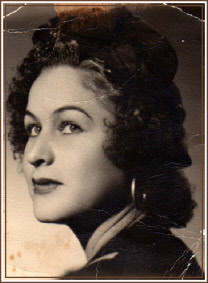
HOME
TANGO CORNER
ART/CULTURE
TRAVEL
NEWS/EVENTS
“A SENSORY BRIDGE TO GLOBAL CULTURE”
PUBLISHER’S CORNER

Malena
Malena canta el tango
como ninguna
y en cada verso
pone su corazón;
a yuyo del suburbio
su voz perfuma,
Malena tiene pena
de bandoneón.
Tal vez allá en la infancia
su voz de alondra
tomó ese tono oscuro
del callejón,
o acaso aquel romance
que sólo nombra
cuando se pone triste
con el alcohol.
Malena canta el tango
con voz de sombra,
Malena tiene pena
de bandoneón.
Tu canción
tiene el frío del último encuentro,
tu canción
se hace amarga en la sal del recuerdo.
Yo no sé
si tu voz es la flor de una pena,
sólo sé
que al rumor de tus tangos,
Malena,
te siento más buena
más buena que yo.
Tus ojos son oscuros
como el olvido,
tus labios apretados
como el rencor,
tus manos, dos palomas
que sienten frío,
tus venas tienen sangre
de bandoneón.
Tus tangos son criaturas
abandonadas
que cruzan sobre el barro
del callejón
cuando todas las puertas
están cerradas
y ladran los fantasmas
de la canción.
Malena canta el tango
con voz quebrada;
Malena tiene pena
de bandoneón.
Malena
Malena sings the tango
like no one else can
and in every verse
she pours out her heart;
her voice perfumes
the weeds of the slums,
Malena’s filled with sorrow
of the bandoneon.
Perhaps, somewhere in her childhood, her skylark voice
acquired that dark tone
of the alley,
or of that romance
she only mentions
when she becomes melancholy
from drink.
Malena sings the tango
with her voice in the shadows;
Malena’s filled with sorrow
of the bandoneon.
Your song
has the chill of a last rendezvous,
your song
gets bitter with the saltiness of memories.
I don’t know
if your voice is the blossom of pain,
I only know
that with the murmur of your tangos, Malena,
I feel you’re better
much better than I.
Your eyes are as dark
as oblivion,
your lips, pursed together
with bitterness,
your hands, two doves
that feel the cold,
your veins carry blood
of the bandoneon.
Your tangos are abandoned children
that cross through the mud
in the alley,
when all the doors
are shut
and the ghosts
of song howl.
Malena sings the tango
in a quivering voice;
Malena’s filled with sorrow
of the bandoneon.


Advertise in:
AS WE INAUGURATE
TANGO LIFE & NEWS
TAKE ADVANTAGE OF OUR EXCLUSIVE
ONE-TIME OFFER TO PLACE YOUR AD HERE
FREE DURING NOVEMBER!
ADVERTISERS, DON’T MISS THIS CHANCE TO FEATURE
YOUR BUSINESS IN PREMIUM WEB SPACE
THAT WILL BE SEEN BY A GLOBAL AUDIENCE!
FOR DETAILS.
312.287.8406
AS A SPECIAL INTRODUCTORY BONUS, YOU’LL ALSO RECEIVE A DISCOUNT ON ADS PLACED THROUGH JANUARY 6, 2011.

Dear Malena,
I’ve heard about the Argentine “cabeceo” method of asking a lady to dance. How exactly is it done and what are its advantages?
― Curious in Chicago
Dear Curious,
The “cabeceo” is a slight nod of the head that a gentleman makes to a lady when he’d like her to dance with him and that she makes back to him when she accepts his offer. In Buenos Aires, a man does not approach a lady’s table to ask her to dance. He tries to make eye contact with her while still sitting at his table. If she meets his eyes (as she will also be trying to make eye contact with a favored partner) and nods back, they will join together on the floor to dance.
The advantage of the “cabeceo” is that if a man or woman doesn’t want to dance with someone, he or she simply avoids making eye contact with them, and in that way, no one is directly turned down.

MALENA OF PERCAL
Let me introduce myself. My name is Malena. Some have said that I’m the soul of the tango. You may know about me through the tango written in my honor in 1941 by Lucio Demare, with lyrics by Homero Manzi. I was young then but had already suffered some of life’s disillusions. However, I have evolved and have been kept alive, vibrant and full of enthusiasm by the many tango musicians, dancers and aficionados all over the world ―You may even say I’m timeless.

Frequently, my admirers write to me with questions. Let me share a few of their letters with you about the milonga (tango social dance).


CLICK IMAGE TO ENLARGE.
Dear Malena,
I’ve been taking tango classes for several months and am getting up the nerve to start going to milongas (ladies, be patient, please!). My instructors have taught me some good dance techniques but can you give me any “rules” for the dance floor?
― Ready to Rock
Dear Ready,
It is indeed refreshing to encounter someone who is concerned with etiquette on the dance floor! Not enough of today’s tango dance instructors bother to teach a few simple rules of common sense that can make the difference between bumping into and stepping on other dancers and having a relaxed, pleasant dance around the floor. Here they are:
1. Do not take a step backward unless you are absolutely sure there is no one immediately behind you.
2. Always observe the line of dance (counter clock-wise around the room).
3. Do not try to lead your partner into ganchos, boleos or any other moves that could cause her to kick or step on anyone dancing close to you, especially if the dance floor is crowded.
4. Do not hold up traffic. If there’s a move you’d like to try that will stop the flow of couples coming behind you, lead your partner into the middle of the floor and try it out there.
5. As you become a more experienced dancer, don’t be tempted to impart your knowledge to your partner while dancing in the milonga. Save it for a “practica” (practice session) or class environment.
6. Be conscious and respectful of the other dancers on the floor. If you want to perform, find a stage!
Meet you on the dance floor,
Dear Malena,
I’m a relatively new tango dancer. I just started going to milongas but I’m not asked to dance that often. What should I do?
-- Willing But Not So Able
Dear Willing,
Your problem is a common one, but do not despair! There are several things you can do:
1. Keep taking classes to improve your dance skills and arrange to go to milongas with classmates.
2. Try to converse with the people sitting around you at the milonga and always keep a smile on your face. No one wants to approach a “sour-puss”.
3. Continue going to milongas. People will get to know you and you’ll become a “regular”. Remember, some men can be shy about asking unknown women to dance.
4. When you’re asked to dance, tell your partner you’re a new dancer. If he’s a gentleman, he won’t try to lead you into moves you’re not ready to execute.
Good luck and keep dancing,


Thank you for your passion, which has sustained me throughout the years. As long as you continue to hear me and dance to me, I will remain alive and thriving.
I am joy, I am sadness, I am pleasure, I am pain ―I AM THE TANGO!
Forever yours,


GOT TANGO RELATED QUESTIONS?
ASK MALENA.
EMAIL HER:
AND WATCH FOR HER ANSWER TO APPEAR HERE SOON!